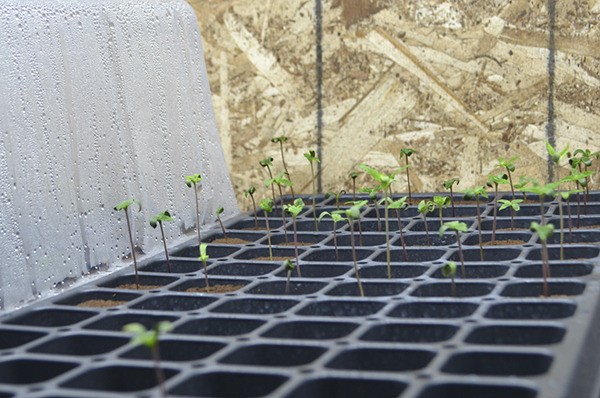If you asked Thomas Ash when he moved to Sequim he’d be growing marijuana, he never would have imagined it.
Now he’s the first of his kind in Sequim and on the North Olympic Peninsula — a marijuana producer tier 2 — to grow recreational marijuana.
Ash, a retired health care executive and current health care consultant and farmer, said he had to come around to the idea of growing marijuana after his wife, Jean Davis, first suggested it.
“We’re not users or advocates,” Ash said. “We’re a business who saw a good business opportunity. This made more business sense than anything I’ve looked at in a long time. The return is relatively high.”
Ash received notification from the Washington State Liquor Control Board about his business’ Tropic Grow LLC, license on April 1 to grow up to about 2,800 marijuana plants inside his Dungeness barn. He anticipates the first growth being ready this summer for recreational retail locations.
His long-term goal is to create a legacy through the business venture.
“By being early in, I hope (the business) can last a long-time and be profitable and be something my descendants can take on,” he said.
In the months leading up to Ash’s farm becoming a certified growing site, he worked with Clallam County to receive a conditional use permit. He said it’s one of the main reasons he was accepted so early in the process because he was pre-approved locally.
For his business, he said the barn was thoroughly inspected by the state and he installed mandated cameras with infrared and recording abilities.
He said in the time since he’s started the process, attitudes have begun to change about marijuana particularly the safety aspects particularly property crimes.
“We have a block wall with cameras everywhere so by the time you get in and have a plant, you’ll have your face on camera several times,” Ash said. “Once, you have it, what are you going to do with it?”
The state also requires Ash catalogue all of his seeds and plants.
He was given 15 days from April 1 to buy seeds from anywhere in the world before he must switch to only purchasing in the state. He bought multiple times seeds from Amsterdam.
Retailers coming soon
While Ash is one of only a few handfuls of producers so far in the state, The State Liquor Control Board announced it would begin issuing a lottery system for retail sellers on April 21-25 in accordance with Initiative 502 to permit 334 retail locations statewide. Due to population, the City of Sequim is allowed one.
Ash said this doesn’t mean the top seeds will receive it necessarily but they will be the first to go through the inspection process.
He only will be allowed to sell his product to the 334 licensed retail stores in the state.
Currently, the City of Sequim has a moratorium on marijuana sales and then council restricted producing and processing in city limits.
Ash said he is a Republican conservative businessman, but he doesn’t understand why the city council isn’t supporting how the state voted.
“It’s hard to understand why elected officials are turning backs on people. I don’t get it,” he said.
A majority of city councilors opted for the wait and see how other municipalities handle the marijuana handling process before proceeding.
Start small
A little over two weeks into growing, Ash has two small setups of lights and planters growing so far in one of his renovated barn’s rooms.
His plan is to add a new overhead array setup once a month for a year with about 240 plants a month.
“You have to start somewhere,” Ash said. “It’s trial and error. That’s how you learn.”
He also has two rooms for flowering marijuana including a converted space formerly used to milk cows that need special attention and a tank room.
The rooms are sealed to allow for 12 hours of light and darkness.
Ash and his wife have been studying marijuana mostly from books.
They made the decision to grow four types at a time but plan to adapt to the market, he said.
Their plan is focus on the retail sales mostly by growing 1/4, 1/2, 3/4 and 1 gram packets for retailers and 15 pound “trim” for processors to produce marijuana products like edible goods.
Ash said he’s uncertain if they’ll grow 2-pound bud to sell to other producers.
Along with marijuana, Ash is focusing on growing wasabi and tropical fruits. He said marijuana and wasabi are similar with the amount of effort it takes to cultivate but become more self-sustaining the farther along they go.



